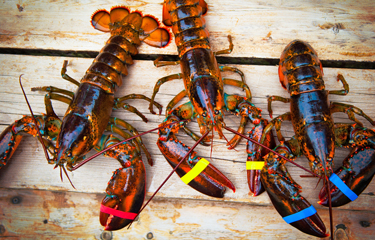On Friday, 5 June, at a meeting with commercial lobstermen from the U.S. state of Maine, U.S. President Donald Trump threatened to impose new tariffs on imported Chinese and European Union goods if they did not eliminate their tariffs on U.S. lobsters.
At the meeting, Trump appointed U.S. Office of Trade and Manufacturing Policy Director Peter Navarro the task of identifying additional Chinese and European products to hit with tariffs as a means of pressuring Beijing to eliminate all tariffs on American lobsters.
“If the European Union doesn't drop that tariff immediately, we're gonna put a tariff on their cars, which will be equivalent coming in... it's going to be the equivalent-plus... watch how fast that tariff comes off,” Trump said during the discussion of the issue at the roundtable in Bangor, Maine.
The same day, Reuters reported neither the European Union’s delegation in Washington D.C. nor the Chinese embassy had an immediate response to Trump’s threats.
However, on Tuesday, 9 June, Huo Jianguo, former president of the Chinese Academy of International Trade and Economic Cooperation, and Xue Rongjiu, deputy director of the Beijing-based China Society for WTO Studies, said China will not reduce its tariff on U.S. lobsters.
"It's impossible for China to reexamine its tariff policies just because of a single idea put forward by the U.S.," Huo told the China Daily.
China has imposed incrementally increasing tariffs starting at 25 percent and reaching up to 40 percent on most imported seafood from the U.S, in response to tariffs on several rounds of tariffs placed on Chinese goods by the Trump administration since 2018. Since then, U.S. lobster exports to China have plummeted 65 percent. That drop has been accelerated by China’s decision to lower tariffs on Canadian lobsters. China's tariff on live U.S. lobsters currently stands at 32 percent, putting the United States at a major disadvantage to Canada, which faces a 7 percent tariff for its own live lobsters.
China’s appetite for North American lobsters hasn’t abated much, even with the coronavirus affecting trade and consumer habits, according to China Daily. Supermarket chain Metro China said lobster sales at its stores soared 51.3 percent year-on-year between January and May, and Chinese e-commerce platform JD.com also reported strong sales of the crustacean.
Huo said since the United States initiated the trade war, it should be the first country to begin scaling back its tariffs.
“If the Office of the U.S. Trade Representative announced more tariff exemption policies for China, China can issue new tariff exemptions for the U.S. based on equality and mutual benefits, or both parties can start negotiations under appropriate conditions in the future," he said.
The country’s leadership believes the trade war between the two countries should be ramped down on a wholescale level, Xue said.
"Negotiations between the two countries are surely not a one-way street. If U.S. lobster exporters would like to further expand their market share in China, business cooperation between the world's two largest economies should follow commercial principles,” Xue said.
Moving forward, trade negotiations between the U.S. and China should follow the rules of the World Trade Organization, Huo said, with the end goal of eliminating unfair trading practices.
"The U.S. should let the market and companies' leaders make decisions. It is the government's job to establish platforms for U.S. enterprises to enter or expand in foreign markets, instead of using excessive administrative power to reach its goals," he said.
Photo courtesy of marla dawn studio/Shutterstock







